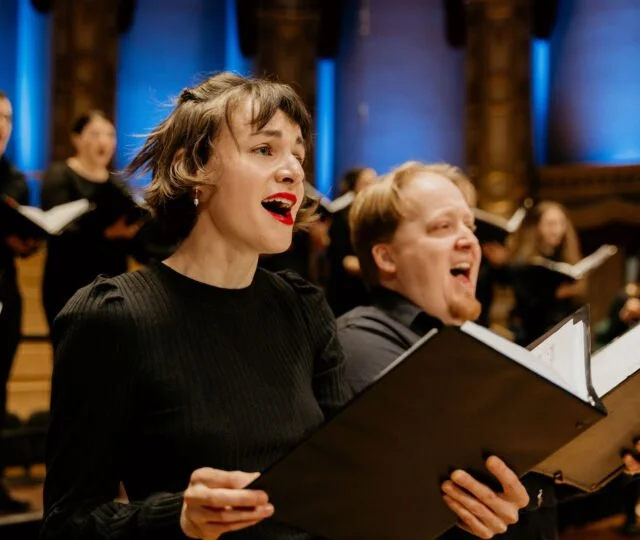Music review: Vancouver Bach Choir opens its season with program to soothe and move the soul
Evening featuring Fauré’s Requiem and Bernstein’s Chichester Psalms offered moments of stunning beauty and clashing dissonance
Vancouver Bach Choir. Photo by Michelle Diamond
Vancouver Bach Choir.
AS THE FIRST atmospheric river of the fall descended upon us on Friday, there was perhaps no warmer place to be than at St. Andrew’s-Wesley United Church, where the Vancouver Bach Choir welcomed drenched concertgoers to their season opener.
Joined by soloists Sydney Trotter (soprano), Obi Ifediora (bass-baritone), Hongchi Chen (boy soprano), and the small Vancouver Bach Chamber Players string ensemble, the choir delivered a soothing, if at times uneven, program of works by Gabriel Fauré and Leonard Bernstein.
The evening began with Fauré’s Cantique de Jean Racine, a serene, lilting work written when the composer was just 19, with text from Racine’s lush French reworking of a Latin hymn. Sweet and gentle, as the sopranos soared with the words “âme languisante” (“languishing soul”), it felt like a ray of light amid the rain, even if the strings’ intonation could have used a bit more finesse.
The real meat of the concert followed with Fauré’s Requiem, a soaring seven-movement work written two decades after his Cantique, this time using the original Latin of the Catholic Mass of the Dead. The piece has been described as a “lullaby of death”, reflecting Fauré’s perspective that life’s end is not tinged with the fear of eternal damnation and judgment, but is a peaceful transition to peace and rest.
That said, there’s no getting around the fact that a pipe organ can’t help but add a sense of foreboding to just about anything—add in the opening incantation of “Requiem aeternam” of the first “Introit et Kyrie” movement, and you’re bound to generate some goosebumps. That ominousness dissipated as the movement went on, culminating in a rapturous, oceanic “Exaudi”.
While at times almost swallowed by the musicians, soloists Ifediora and Trotter both shone with clarity and tonal precision as they took their moments in the spotlight—the bass baritone in the second “Offertiore" movement, and the soprano lending her clarion voice to the tender fourth movement, “Pie Jesu”. Perhaps the most affecting movement was the third, a lilting “Sanctus”, with a gently rocking harp line gently driving forward to an ecstatic “Hosanna” in the tenors, gently echoed by the sopranos and ending with a trilling violin solo.
A shift in mood came in Bernstein’s three-movement Chichester Psalms, a formidable piece sung in Hebrew that opened with a jolt of dissonant voices, crashing cymbals, and the rousing words “Urah, hanevel, v’chinor! / A-irah shahar!” (“Awake, psaltery and harp! / I will rouse the dawn!”).
More challenging for both listeners and performers, with its unconventional time signatures and intricate rhythms, it also offered the most beautiful moment of the evening, when Chen’s pure, unfettered soprano proclaimed Psalm 23 in its second movement—”Adonai ro-i, lo ehsar”; familiar to most as “The Lord is my shepherd, I shall not want.” This section gave way to the frenetic, dissonant verses of Psalm 2, “Lamah, rag’shu goyim” (“Why do the nations rage…”)—words written thousands of years ago, but all too relevant today.
Most touching were the evening’s final words, sung with a hope that feels so distant today: Hineh mah tov, / Umah nayim, / Shevet ahim / Gam yahad.” (“Behold how good, / And how pleasant it is, / For brethren to dwell / Together in unity.” Amen to that. ![]()

























